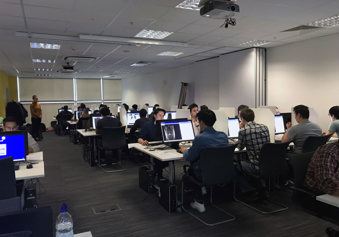FRCR Part 2A (Radiology) - CR2A - guidance notes for candidates
LEARN MORE1 Examination Structure
The Final FRCR (Part A) examination comprises two papers of single best answer (SBA) questions. The examination is held twice a year: normally in November and April. The examination papers comprise a mix of questions from across a wide range of the curriculum:
- Cardiothoracic and Vascular
- Musculoskeletal and Trauma
- Gastro-intestinal
- Genito-urinary, Adrenal, Obstetrics & Gynaecology and Breast
- Paediatric
- Central Nervous and Head & Neck
2 Attempts
No candidate will automatically be permitted more than six attempts at any FRCR examination. In order to attempt an examination for a seventh, or further time, candidates will have to demonstrate additional educational experience.
3 Content
Each paper comprises 120 SBA questions. Candidates are given three hours to answer each paper. Each SBA question comprises a stem (a question or statement) and five items (answers) labelled (a) to (e). Candidates are asked to decide which one of the five items represents the best answer to the question given in the stem.
4 Standard Setting
A ‘modified’ Angoff method is used to set the pass mark or standard for this exam. This involves a panel of subject matter experts (examiners) evaluating each question and providing an estimate as to how likely the just-passing candidate would know the answer. Each item is scored on the basis of the percentage of ‘just passing’ candidates who should know the correct answer. These scores are collated and presented at the standard setting meeting. After discussion, the standard setters again score the questions, the highest and lowest scorers are removed, and the mean of the remaining post-discussion scores is used to set the standard. The final pass mark is determined after the examination using the Hofstee compromise method. This takes account of candidate performance in the examination alongside judgements made by standard setters. The candidate cohort and pass rate will vary from sitting to sitting.
5 Marking
The examination is marked by the examination software Speedwell and the marking system shown below is used:
| For each item correctly answered | +1 mark |
| For each item incorrectly answered | 0 marks |
The examination is not negatively marked and therefore candidates are encouraged to offer an answer to all of the questions.
There is no concept of a mark or result (pass or fail) in each of the two papers as the examination of 240 questions is viewed as a whole assessment.
6 Quality Assurance
After each sitting, and prior to results publication, a group of expert examiners conduct a statistical review of the question paper performance and quality control checks to make sure all the questions and answers are fair. This analysis allows the RCR to ensure that the
examination is reaching optimal levels of reliability and fairness. Poorly performing questions are scrutinised and are removed if error or ambiguity is found. If any questions are removed from the examination then the pass mark is adjusted accordingly. Candidates will not be
disadvantaged where this occurs. All examination results are checked by RCR staff before being published to candidates.
7 Equipment Required for the Examination
Candidates are required to bring written implements, should they wish to use any scrap paper, and a non-programmable pocket calculator.
Candidates are provided with a reference sheet for use during the examination. This gives information about normal ranges for investigations and frequently used abbreviations.
8 Further Information
Queries arising from this document should be addressed to the RCR’s Examinations Office, either by email to [email protected] or by telephone on 020 7406 5905.
Queries at the time of the examination should be raised with the invigilators. Comments, feedback or complaints following the examination should be brought to the attention of the Examinations Manager, either by email to [email protected] or by telephone on 020 7406 5905.
Our exams
Find out more about our FRCR exams in clinical radiology and clinical oncology, and DDMFR exams in dental and maxillofacial radiology.
